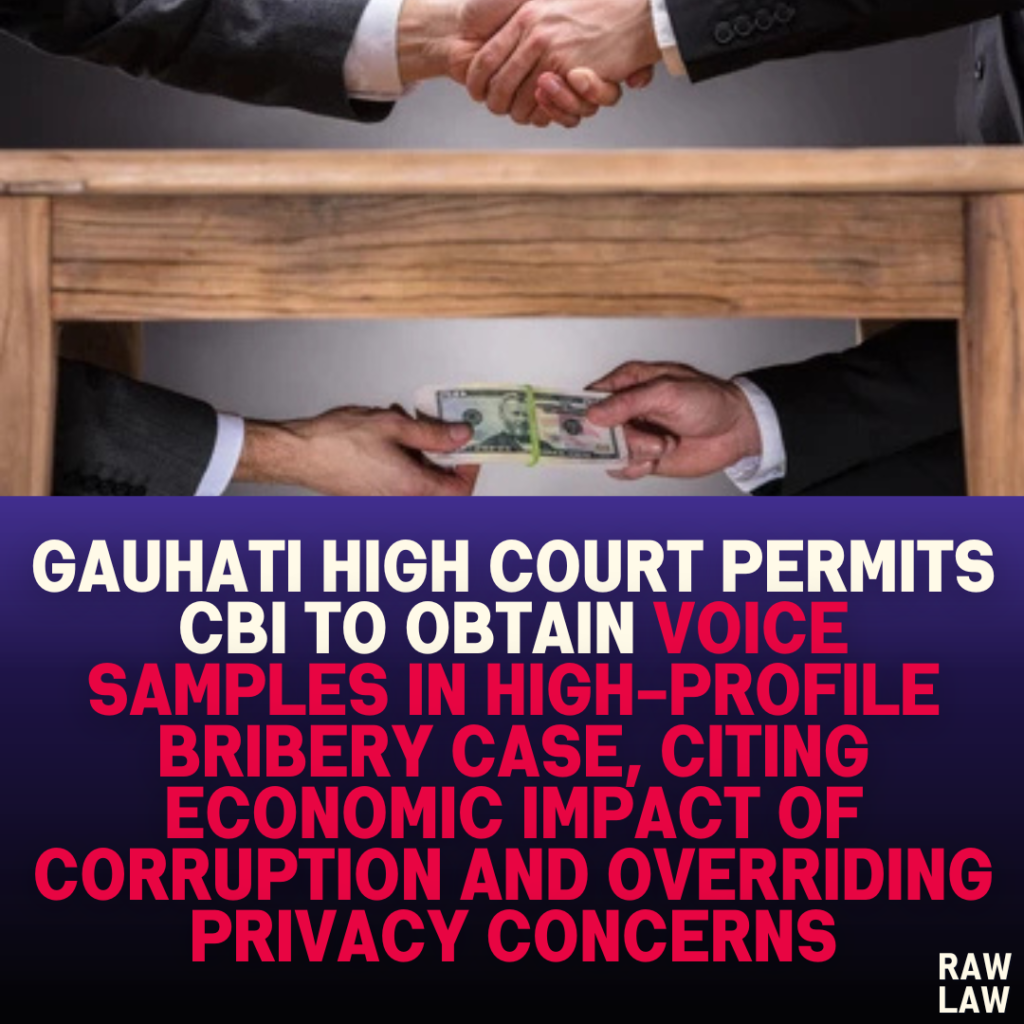Court’s Decision
The Gauhati High Court ruled in favor of permitting the Central Bureau of Investigation (CBI) to pursue a renewed petition for obtaining voice samples from the accused. The court emphasized that while the right to privacy is fundamental, it is not absolute, especially when public interest is concerned, such as in cases of corruption where public money and societal interests are involved.
Facts
This case originated from allegations against several high-ranking government officials and businessmen involving bribery for favorable tax rulings. The CBI registered a First Information Report (FIR) and claimed that intercepted telephone conversations indicated the accused’s involvement in bribery, with recorded conversations substantiating a demand for Rs. 50 Lakhs, later negotiated to Rs. 40 Lakhs. The CBI sought voice samples from the accused to match against the intercepted audio as part of its investigation.
Issues
- Whether the interception of telephonic conversations by the CBI complied with the legal requirements under the Indian Telegraph Act.
- If the voice samples of the accused are necessary and permissible evidence in light of privacy rights.
Petitioner’s Arguments
The CBI argued that its interception of telephonic conversations was legally authorized under the Indian Telegraph Act, specifically in the interest of public safety. It further contended that obtaining voice samples was essential to establish the veracity of the intercepted conversations and corroborate the bribery charges.
Respondent’s Arguments
The respondents asserted that the telephonic interceptions breached their right to privacy as protected under Article 21 of the Constitution, emphasizing that the intercepted conversations did not meet the “public emergency” or “public safety” criteria stipulated under Section 5(2) of the Indian Telegraph Act. They also questioned the legality of the CBI’s second revision petition, arguing it was barred by the withdrawal of an earlier revision petition on the same matter.
Analysis of the Law
The court examined the interplay between Section 5(2) of the Indian Telegraph Act and Rule 419-A of the Telegraph Rules, which authorizes interceptions for reasons of public safety or emergency. Additionally, the court considered the application of the right to privacy, balanced against the state’s interest in addressing serious offenses involving public resources and corruption.
Precedent Analysis
The court reviewed relevant precedents, including PUCL v. Union of India and Ritesh Sinha v. State of Uttar Pradesh, where it was held that while privacy is a fundamental right, it may be overridden by public interest. The court also noted that intercepted telephonic conversations could be admitted as evidence if collected according to established procedures.
Court’s Reasoning
The court found that the CBI’s actions were consistent with established law, noting that corruption, particularly in public offices, impacts public safety and societal interests. It held that while “public emergency” might not apply directly to this case, the economic implications of corruption warranted the use of intercepted conversations as evidence. The court emphasized that procedural requirements under the Telegraph Rules, including review by a Screening Committee, were met, and thus, the interceptions were legally valid.
Conclusion
The Gauhati High Court allowed the CBI to pursue its petition to obtain the voice samples, underscoring that such samples are critical to the investigation and could establish the credibility of the intercepted communications. The court rejected the claim that the right to privacy was infringed, given the broader public interest involved.
Implications
This decision reinforces the state’s ability to override privacy concerns in cases of significant public interest, such as corruption. It underscores that while privacy is protected, it is not an absolute right when balanced against serious economic offenses that impact the public. The ruling further clarifies procedural expectations for the admissibility of intercepted communications in corruption-related cases.
